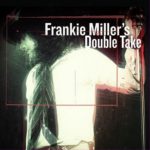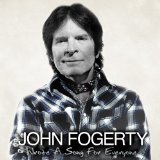 The promotion campaign for “Double Take” features some of the artists involved (Rod Stewart, Paul Carrack and Huey Lewis) talking about the first time they saw Frankie Miller. Now, that’s a great idea.
The promotion campaign for “Double Take” features some of the artists involved (Rod Stewart, Paul Carrack and Huey Lewis) talking about the first time they saw Frankie Miller. Now, that’s a great idea.
Freshers’ Week, Dundee University, 1976 and the first gig of the year was Frankie Miller’s Full House. I went to the gig with my new mate Steve (still a mate and writing great reviews for MusicRiot). The band were superb and we left the gig raving about Ray Minhinnet’s guitar work, Chrissy Stewart’s bass playing, but most of all about Frankie’s stunning soul voice. He started the ballad “With You in Mind” a cappella, and with perfect pitch, before the band dropped in underneath the vocal; I was completely hooked from that moment. I’ve seen an awful lot of gigs since then, but I’ve never heard a band that nailed it so completely, song after song.
So let me put “Double Take” into some kind of personal and historical context. As Frankie slowly fought back from the brink after a brain haemorrhage in 1994, you would hear occasionally from friends on the Scottish music scene about his progress; not frequently, but often enough to know that things were gradually improving, and it carried on like that until 2012 when word started to leak out that a project with Frankie’s old demo tapes was in progress. It’s taken over four years and probably a few unexpected twists and turns, but the final result is “Double Take”, nineteen unreleased Frankie Miller originals reconstructed from demo vocals, and all but one reimagined as duets with singers that wanted to be involved with the project. Although Frankie’s biggest chart hits (“When I’m Away From You” aside) were interpretations of other people’s songs, he also wrote a shedload of great songs for himself and other artists.
The nineteen songs on “Double Take” are pretty representative of Frankie’s songwriting output, covering soul, blues, rock, country and ballads. And that’s the staple diet of Scotland, right there; forget your deep fried Mars Bars. All of the songs have been arranged around the original demo vocals (with Frankie involved in quality control), but the quality of the voice is so good that almost everything sounds like a full-scale production. To be honest, given the choice, I’d rather listen to Frankie Miller demos than most singers’ finished product.
The guests on “Double Take” are a mix of megastars and people that Frankie knew and worked with in the past. Without listing the whole lot, how about Joe Walsh, Elton John, Kid Rock, Delbert McClinton, Kim Carnes and Willie Nelson. Add those to the ones listed at the top of the article and you’ve got a huge amount of respect across musical styles for Frankie’s work. Great news for fans of Frankie from the mid-seventies is that Full House appear on three songs in the middle of the album. “When It’s Rockin’” (with Steve Dickinson) is a horn-driven rocker, “Beginner at the Blues” (with Delbert McClinton) is a slow blues and “To Be With you Again” (with Kim Carnes) is a mid-tempo ballad. For a while there, I was back in that night in1976.
With so many songs and such a variety of arrangements, it’s difficult to pick standouts, but the gospel choir of “Where Do the Guilty Go” (with Elton John) and the country ballad “I Want to Spend My Life with You” (with Willie Nelson) are hard to beat, while the hauntingly simple “I Do”, with only Frankie’s vocal over a sparse arrangement is the perfect closer for the album.
This has been a long journey for some very dedicated people, culminating in an album that can only add to Frankie Miller’s legacy by bringing those powerful vocal performances to a wider audience and unearthing so many unreleased songs. This is a classic.
“Double Take” is out on September 30th on Universal.
Here’s a sneaky little peek for you:
 So, what’s this all about then? John Fogerty, former Creedence Clearwater Revival frontman and highly respected solo artist has decided to revisit some of his back catalogue with a few collaborators and throw in a brace of new songs for good measure. It’s not a new idea and it can be either a cynical attempt to cash in on a few good, old songs or a chance to invite fellow musicians to put their stamp on your songs. I’m really pleased to say that “Wrote a Song for Everyone” is a fascinating look at the heritage of one of the great rock songwriters and performers. You have to approach this with an open mind; some of the songs, in their original incarnations, were massive teenage favourites of mine through happy and sad times but there are some radically different interpretations here. The conventional view is that Eagles popularised the country-rock genre, but you could make the same case for Creedence if you take your country influences from New Orleans rather than Bakersfield; just a thought.
So, what’s this all about then? John Fogerty, former Creedence Clearwater Revival frontman and highly respected solo artist has decided to revisit some of his back catalogue with a few collaborators and throw in a brace of new songs for good measure. It’s not a new idea and it can be either a cynical attempt to cash in on a few good, old songs or a chance to invite fellow musicians to put their stamp on your songs. I’m really pleased to say that “Wrote a Song for Everyone” is a fascinating look at the heritage of one of the great rock songwriters and performers. You have to approach this with an open mind; some of the songs, in their original incarnations, were massive teenage favourites of mine through happy and sad times but there are some radically different interpretations here. The conventional view is that Eagles popularised the country-rock genre, but you could make the same case for Creedence if you take your country influences from New Orleans rather than Bakersfield; just a thought.
The album opens with “Fortunate Son”, which is amped-up by the Foo Fighters to a full-on rocker (no surprise there) before Keith Urban delivers a banjo-led country-rock version of “Almost Saturday Night” which takes the song back to its lyrical roots and “Lodi” (probably my favourite John Fogerty song) gets the Status Quo “Rocking All Over the World” treatment with John’s two sons Shane and Tyler Fogerty. Incidentally, this is the only collaboration that Fogerty arranged, pulling rank with his two sons when he didn’t like their country-rock arrangement. “Mystic Highway” is one of the new songs and breaks down into 3 sections, the main song, an instrumental section and an a capella breakdown with a strong feel of the Doobie Brothers “Black Water”. “Wrote a Song for Everyone” features a Miranda Lambert vocal and some exceptional guitar work from Tom Morello; so far so good.
The Zac Brown Band reworking of “Bad Moon Rising” in a Cajun style works less well for me, losing the brooding menace of the original version. “Long as I can See the Light” with My Morning Jacket sticks fairly close to the original, retaining the organ riff which characterises that version and is followed by Kid Rock’s take on “Born on the Bayou”. Apparently it’s now a violation of several federal statutes to record a collaboration album without including a Kid Rock track. The album’s second new song “Train of Fools” follows, exploring similar territory to Springsteen’s recent “Land of Hope and Dreams”. It’s obvious that John Fogerty can still write a good song and the new songs sit very comfortably alongside his earlier work on this album.
“Someday Never Comes” with Dawes has Taylor Goldsmith singing the verses about the things we tell kids (and adults) to shut them up while Fogerty takes the choruses as the gruff old bad guy who tells us that it’s all lies. Bob Seger delivers the Woodstock song “Who’ll Stop the Rain” very much in the style of his 1976 classic “Night Moves”, which works very well. If any singles are to be released from the album, “Hot Rod Heart” should be top of the list. It’s a great driving song (maybe it’s time we had an alternative to the lazy radio programming of Don Henley’s “The Boys of Summer” every time the sun shines for more than five minutes) and the last couple of minutes consists of Fogerty and Brad Paisley trading superb guitar solos and generally having a good time. I bet Paddy McAloon wouldn’t like it.
“Have You Ever Seen the Rain” with Alan Jackson works perfectly with a pure country arrangement with banjo, fiddle and steel guitar filling out the sound and leads us into the last track of the album. I’ve heard many versions of “Proud Mary”, but nothing quite like this. The first verse and chorus are pure gospel with Jennifer Hudson backed by a gospel choir and the wonderful Allen Toussaint before speeding up to a Cajun boogie with the full band and accordion and horns for good measure. I used to think the Ike & Tina Turner version was over the top, but they only used one kitchen sink and I think there’s about three here. It’s a glorious way to end a great album.
John Fogerty has survived in the music business for a long time with all of the usual peaks and troughs that anyone big in the sixties and seventies went through including the publishing disputes, particularly the publishing disputes. The reason he’s still around is that he loves what he does and he’s very good at it. “Wrote a Song for Everyone” is a very, very good album.
Out now on Vanguard (88765487152).


